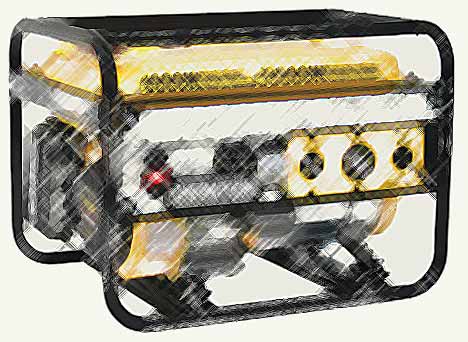Generator Safety

With the prediction or onset of powerful storms, people rush out to buy generators. For many people, it is the first time they have ever used a generator. Spend a few minutes BEFORE the storm, making sure your back-up power generator is ready to go. Check the oil and gas levels in your generator (and for re-supply) BEFORE the storm.
There are also several important safety precautions to keep in mind before and while operating a generator.
To avoid carbon monoxide hazards:
- Always use generators outdoors, away from doors, windows and vents.
- Never use generators in homes, garages, basements, crawl spaces, or other enclosed or partially enclosed areas, even with ventilation. This should go without saying, but every year you hear stories like people having run their generator in the basement, etc., and dieing from carbon monoxide poisoning. A little common sense here…
- Follow manufacturer’s instructions. Generators vary. Understand your specifications and operating instructions.
- Install battery-operated or plugin (with battery backup) carbon monoxide (CO) alarms in your home, following manufacturer’s instructions.
- Test CO alarms often and replace batteries when needed.
To avoid electrical hazards:
- Keep the generator dry. Operate on a dry surface under an open, canopy-like structure, or fashion some sort of protection to keep it dry.
- Dry your hands before touching the generator.
- Plug appliances directly into the generator or use a heavy-duty outdoor-rated extension cord. Look for 12-gauge wire rating and avoid 16-gauge extension cords.
- Make sure entire extension cord is free of cuts or tears and the plug has all 3 prongs, especially a grounding pin.
- NEVER plug the generator into a wall outlet. This practice, known as back-feeding, can cause an electrocution risk to utility workers and others served by the same utility transformer if the main line breaker to the house is left ON (in other words… shut it OFF).
- If necessary to connect generator to house wiring to power appliances, have a qualified electrician install appropriate equipment. Or, your utility company may be able to install an appropriate transfer switch.
- Know your generator specifications and limitations. Do not overload its rating. The power requirements of appliances adds up quickly.
To avoid fire hazards:
- Before refueling the generator, turn it off and let it cool. Fuel spilled on hot engine parts could ignite.
- Always store fuel outside of living areas in properly labeled, purpose-built gasoline containers.
- Store fuel away from any fuel-burning appliance.
More: Best Fuel Additive For Generators
More: Generator Maintenance For Preparedness
More: Best Extension Cord For Your Generator
